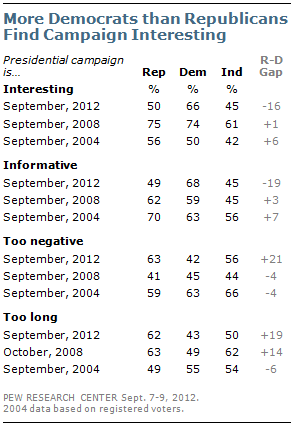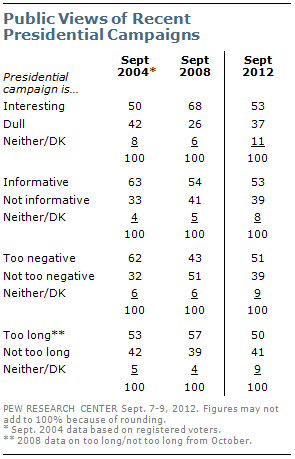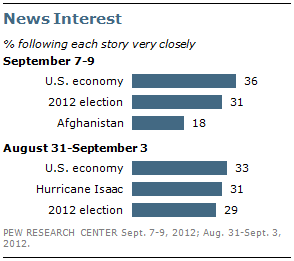Overview

In the wake of the party conventions, Democrats express increasingly positive views of the presidential campaign. And today, substantially more Democrats than Republicans view the campaign as interesting and informative.
The latest national survey by the Pew Research Center for the People & the Press, conducted Sept. 7-9 among 1,012 adults, finds that 66% of Democrats say the presidential campaign is interesting while just 27% say it is dull. Among Republicans 50% say it is interesting while nearly as many (45%) describe it as dull. The gap is about as wide in opinions about whether the presidential campaign is informative – 68% of Democrats say it is informative, compared with 49% of Republicans.
In September 2008, nearly identical percentages of Republicans (75%) and Democrats (74%) said the campaign was interesting. And similar majorities of both groups viewed the campaign as informative (62% of Republicans and 59% of Democrats).

Republicans also are more likely than Democrats to say the current campaign is too negative. More than six-in-ten Republicans (63%) say it is too negative; just 42% of Democrats express this view. In September 2008, 41% of Republicans and 45% of Democrats said the campaign was too negative.
Most Republicans (62%) say the presidential campaign is too long, compared with 43% of Democrats. In 2008, 63% of Republicans and 49% of Democrats said the campaign was too long.
Among the public as a whole, fewer people say the campaign is interesting than did so at about the same point in the 2008 race (53% now, 68% then). About as many say the campaign is informative as did so in September 2008. More people say the campaign is too negative than four years ago, while somewhat fewer say it is too long.
How Opinions Have Changed This Year
Over the course of the current campaign, views of the race have changed substantially. Far more people find the campaign interesting and informative than did so in June or March.
But virtually all of the increase in positive campaign evaluations has come among Democrats and independents. Republicans currently express about the same opinions about the campaign as they did in March, during the GOP primaries, with one exception: More Republicans now say the campaign is too negative than did so then.
Republicans are now more likely to say the campaign is interesting and informative than in June, after the primaries ended. Nonetheless, about the same number of Republicans say the campaign is interesting (50%) and informative (49%) as did so in March (52% and 47%,

respectively).
Over the same period, Democrats’ views of the 2012 campaign have improved dramatically. About two-thirds of Democrats say the presidential campaign is interesting (66%) and informative (68%). In March, just 36% of Democrats called the campaign interesting and 44% called it informative.
Notably, an increasing percentage of independents also finds the campaign interesting. Currently, 45% of independents say it is interesting, up from 31% in March and 27% in June.
Most Republicans think the campaign is too negative (63%) and too long (62%). Far fewer Democrats say the campaign is too negative (42%) or too long (43%). In March, about as many Democrats (54%) as Republicans (51%) said the campaign was too negative and there was a more modest gap in the percentages calling the campaign too long (64% of Republicans, 53% of Democrats).
No Spike in Campaign Interest after Conventions
Following the Republican and Democratic conventions, there has been no increase in interest in news about the election. Overall, 31% say they have been following news about candidates for the 2012 presidential election very closely. Interest was about as high in the week before the Republican convention. In a survey conducted August 23-26, 27% said they

were following news about the presidential election very closely.
Republicans and Democrats are about equally likely to have been following election news. In the current survey, 40% of Democrats and 37% of Republicans say they followed news about candidates for the 2012 presidential election very closely; somewhat fewer independents (25%) say the same.
In 2008, when, like this year, the party conventions were held in consecutive weeks, interest in campaign news rose after the conventions. In 2004, when the conventions were about a month apart, there also was increased news interest after the pair of conventions. In 2000 and 1996, there was no bounce in interest following the party conventions.
Recent Weeks’ News

The economy was the public’s top story last week, outpacing interest in the election and news about events in Afghanistan. Overall, 36% say they followed news about the condition of the U.S. economy very closely compared with 31% who very closely followed election news and 18% who followed the current situation and events in Afghanistan.
A week prior, public interest was divided among the economy, Hurricane Isaac and the election. A third (33%) said the followed news about the economy very closely, 31% followed news about Hurricane Isaac very closely and 29% followed news about the candidates for the 2012 presidential election very closely.